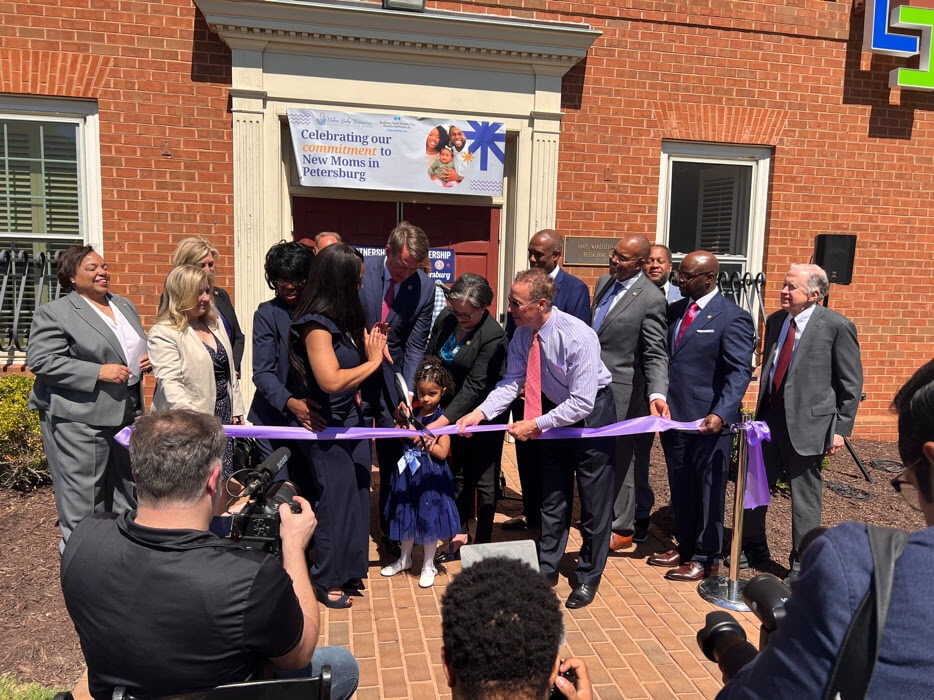
Photo Courtesy of the Office of Rep. Jennifer McClellan
Black Maternal Health Week is a reminder of the devastating impacts of structural racism. These Virginia lawmakers have proposed real solutions to help.
“I almost died during childbirth with my daughter, Samantha [Mills], who was born nine weeks prematurely.”
The statement—part of a longer media release recognizing Black Maternal Health Week—came from Rep. Jennifer McClellan, a Richmond native who recently became a congresswoman. Yet years before her federal level position, the mother of two used her own experience to raise awareness of the needs surrounding Black maternal health.
As recently as January, then-Sen. McClellan spoke on the Senate floor as the Virginia General Assembly debated reproductive freedom, sharing a personal story of her second child’s birth in 2015. At the time, McClellan was 42 years old.
“My placenta burst and I almost bled to death,” she told the Virginia senators. “And I remember being rushed to the hospital, and I remember hearing a doctor say, ‘Everything looks fine,’ and then immediately saying, ‘We’ve got to go to labor and delivery.’”
The last words McClellan recalled hearing from her physician were: “I’m here, and I’m going to take care of it.”
Mills was born nine weeks prematurely, via emergency cesarean section. McClellan’s daughter spent six weeks in the Henrico Doctors’ Hospital’s neonatal intensive care unit (NICU).
When she shared her story at the beginning of the year—recalling the fall of Roe v. Wade last summer—McClellan noted that she was “really glad” that her doctor didn’t have to think about being prosecuted if the delivery went wrong.
“Because in other states when things have gone wrong and someone has shown up, they’d have to ask, ‘Are you close enough to death that I can intervene without prosecution? Do I have to wait until you need a hysterectomy? Do I have to wait until you have sepsis? Or can I make the decision as the provider that my medical training and the standard of care tell me to make?’” McClellan said.
Fortunately, McClellan’s story had a positive conclusion. The medical professionals were able to intervene in time to save her and her baby. Mills will celebrate her eighth birthday on April 29.
Focusing on Black Maternal Health
Sadly, not all stories have the same ending as McClellan’s—especially for women of color. According to the Centers for Disease Control and Prevention (CDC), hundreds of people in the US die during pregnancy or in the year after, and thousands more experience unexpected outcomes of labor and delivery resulting in serious health consequences.
Unfortunately, the problem isn’t improving. Maternal mortality rates rose in the US in 2021. The CDC reported that 1,205 people died of maternal causes in 2021, a 40% increase from the previous year.
Although more than 80% of pregnancy-related deaths nationwide are preventable, Black women remain three times more likely to die from a pregnancy-related cause than white women.
The CDC lists multiple factors that contribute to racial disparities in pregnant women, including:
- Variation in quality healthcare
- Underlying chronic conditions
- Structural racism
- Implicit bias
In response to the maternal disparities Black women face, the Black Mamas Matter Alliance started Black Maternal Health Week in 2018. Since then, the week calling for activism and community building has gained national attention—including proclamations from President Joe Biden.
“Black Maternal Health Week is a reminder that so many families experience pain, neglect, and loss during what should be one of the most joyous times of their lives,” the proclamation’s opening statement read in part. “It is an urgent call for action.”
McClellan also expressed the importance of the awareness week.
“Black Maternal Health Week is an opportunity to uplift the voices of Black mothers, recognize the institutional racism and structural barriers that contribute to poor health outcomes for women of color, and renew our efforts to address the maternal mortality crisis in America,” McClellan said in the press statement about the awareness week. “Maternal death rates in this country are staggeringly higher than other developed nations, and Black mothers experience the highest rates among racial groups. We must do more to combat this crisis. Black mothers in America should not have to fear for our lives.”
Legislation in the Works
McClellan is and has been a strong voice in Virginia, promoting both maternal health and early childhood services.
Her office highlighted that during her time in the Virginia General Assembly, McClellan led passage of the Reproductive Health Protection Act and the Pregnant Worker Fairness Act. She also fought for a constitutional amendment for reproductive freedom, supported the establishment of a Maternal Mortality Review Team, and voted for $22 million in funding to reduce racial disparities in Virginia’s maternal mortality rate.
Still committed to maternal health as a congresswoman, McClellan recently attended the grand opening of a maternal health hub in Petersburg, made possible by a grant from the Anthem Blue Cross and Blue Shield Foundation. Urban Baby Beginnings, a Richmond-based nonprofit, strives to provide community support, workforce development, and advocacy for birthing and postpartum families through maternal health hubs.
There’s also federal legislation in the works in the US Senate. In an effort to aid both maternal and infant health outcomes, Sen. Tim Kaine recently introduced the Mothers and Newborns Success Act.
The act would:
- Strengthen support for women during and after pregnancy
- Expand maternal health research and data collection
- Ensure women are better matched with birthing facilities that meet their specific needs
The legislation also shines an important light on the maternal mortality rate for people of color.
“Black women are nearly three times more likely to die from a pregnancy than white women. We must take action to tackle this disparity, reduce maternal mortality, and strengthen access to care for mothers,” Kaine said in a statement. “This bill is critical to helping ensure all women and their newborns receive the support they need during and after pregnancy.”
Support Our Cause
Thank you for taking the time to read our work. Before you go, we hope you'll consider supporting our values-driven journalism, which has always strived to make clear what's really at stake for Virginians and our future.
Since day one, our goal here at Dogwood has always been to empower people across the commonwealth with fact-based news and information. We believe that when people are armed with knowledge about what's happening in their local, state, and federal governments—including who is working on their behalf and who is actively trying to block efforts aimed at improving the daily lives of Virginia families—they will be inspired to become civically engaged.


VIDEO: Your support matters!
Your support matters! Donate today. @vadogwoodnews Your support matters! Visit our link in bio to donate today. #virginianews #virginia #community...

Op-Ed: Virginia’s new Democratic majorities pass key bills to improve your lives, but will Youngkin sign them?
The 2024 Virginia General Assembly regular session has wrapped up. It was a peculiar session from the outset, with Democratic majorities in the...

Op-Ed: Why Virginia Needs A Constitutional Amendment Protecting Reproductive Freedom
Virginia’s recent election season in 2023 drew in eyes from all over the country. Reproductive freedom was on the line and Virginia remained the...

From the state rock to the state flower, here’s how Virginia got its symbols
Have you ever wondered why the Dogwood is the state flower? Or how the cardinal became the state bird? We’re here to answer those questions and more...

VIDEO: Second-gentleman Douglas Emhoff gives speech on reproductive freedom
Second gentleman, Douglas Emhoff touched on reproductive freedom not only being a woman's issue but "an everyone's issue" during the Biden-Harris...

Glenn Youngkin and the terrible, horrible, no good, very bad night
Election Day 2023 has come and gone, and while there are votes to be counted, one thing is perfectly clear: Virginians unequivocally rejected Gov....





